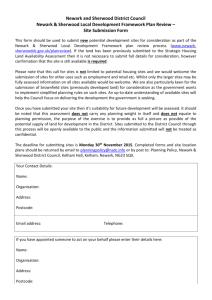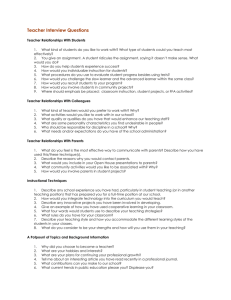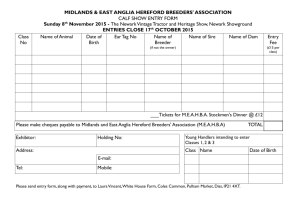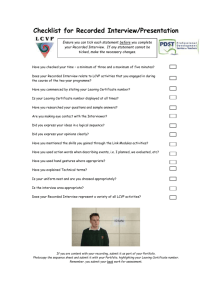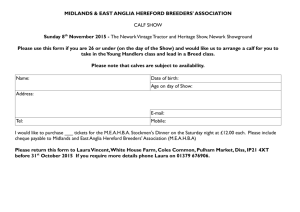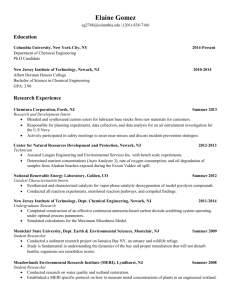In view of the historical value of this oral history - rippey
advertisement
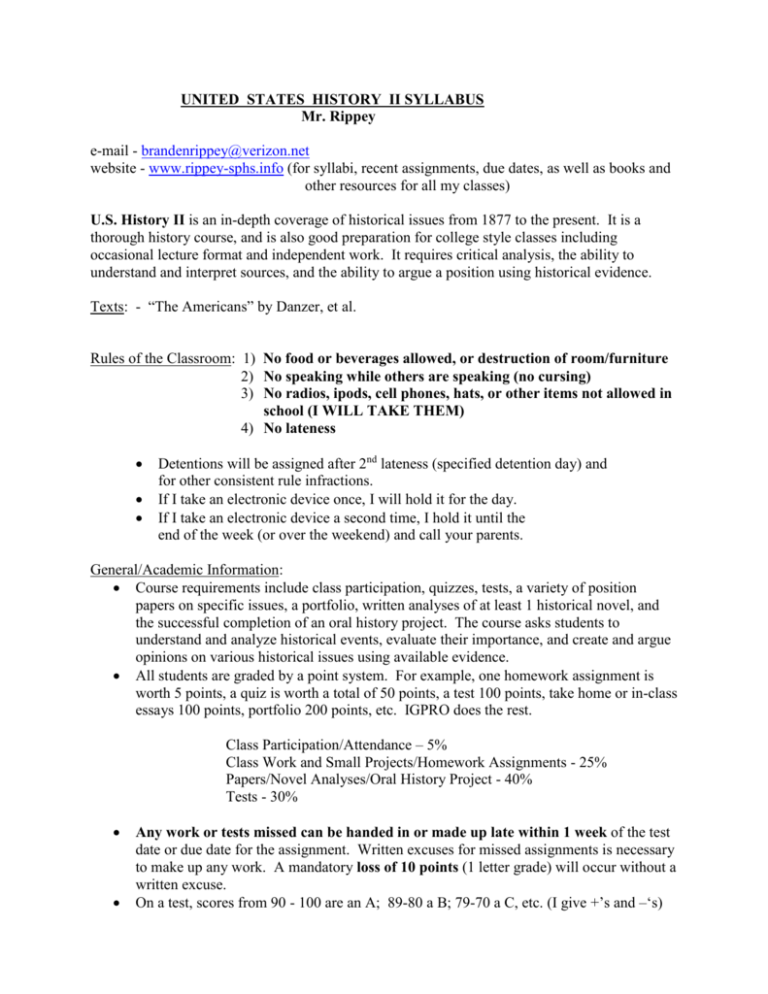
UNITED STATES HISTORY II SYLLABUS Mr. Rippey e-mail - brandenrippey@verizon.net website - www.rippey-sphs.info (for syllabi, recent assignments, due dates, as well as books and other resources for all my classes) U.S. History II is an in-depth coverage of historical issues from 1877 to the present. It is a thorough history course, and is also good preparation for college style classes including occasional lecture format and independent work. It requires critical analysis, the ability to understand and interpret sources, and the ability to argue a position using historical evidence. Texts: - “The Americans” by Danzer, et al. Rules of the Classroom: 1) No food or beverages allowed, or destruction of room/furniture 2) No speaking while others are speaking (no cursing) 3) No radios, ipods, cell phones, hats, or other items not allowed in school (I WILL TAKE THEM) 4) No lateness Detentions will be assigned after 2nd lateness (specified detention day) and for other consistent rule infractions. If I take an electronic device once, I will hold it for the day. If I take an electronic device a second time, I hold it until the end of the week (or over the weekend) and call your parents. General/Academic Information: Course requirements include class participation, quizzes, tests, a variety of position papers on specific issues, a portfolio, written analyses of at least 1 historical novel, and the successful completion of an oral history project. The course asks students to understand and analyze historical events, evaluate their importance, and create and argue opinions on various historical issues using available evidence. All students are graded by a point system. For example, one homework assignment is worth 5 points, a quiz is worth a total of 50 points, a test 100 points, take home or in-class essays 100 points, portfolio 200 points, etc. IGPRO does the rest. Class Participation/Attendance – 5% Class Work and Small Projects/Homework Assignments - 25% Papers/Novel Analyses/Oral History Project - 40% Tests - 30% Any work or tests missed can be handed in or made up late within 1 week of the test date or due date for the assignment. Written excuses for missed assignments is necessary to make up any work. A mandatory loss of 10 points (1 letter grade) will occur without a written excuse. On a test, scores from 90 - 100 are an A; 89-80 a B; 79-70 a C, etc. (I give +’s and –‘s) ANALYSIS OF AN HISTORICAL NOVEL An analysis of an historical novel is not a book report. It is a paper identifying, describing, and analyzing the historical situations and events surrounding the character or characters in that novel. You may mention any literary techniques the author uses to get their points across, but these techniques should not be the focus of your paper. 1) It should include a brief, general description of the plot and setting of the book, 2) but should focus more specifically on what the novel tells you about attitudes, race, work, industry, cities, rural areas, society, politics, the economy, and life in general during that period. Which of these topics you discuss will depend in part on which novels you choose to read. You may choose to show the effects of immigration, industry, politics, and the economy on the lives of the characters. You may choose to focus on the attitudes or opinions of the characters themselves, and how they are affected by their circumstances. Or, you may choose simply to focus on their everyday lives - what they did to get through each day. What was their life like according to the author? 3) You should also identify and explain the author's voice in the work. What is his or her attitude or viewpoint? Are they protesting something in society, or are they justifying the status-quo? What are their views on race, racism, industrialism, the economy, poverty, etc.? Do they do an effective job of describing life during that era? 4) You should use evidence and quotes from the book to explain your points and to support your thesis. All quotes, as well as ideas or themes that you are explaining, must be cited with the page number in parentheses at the end of the sentence or paragraph using them. You may not use any outside sources besides your text book for historical background. Any outside sources (your textbook) should also be cited. Your analysis should be 3-5 pages long. It should not be longer - part of writing with set limits means learning to choose to focus on specific themes or issues. Generally, you will need at least 3 pages to cover the historical themes. You will read and analyze 1 novel this year (Honors classes analyze 2, 1 for each half of the year), and, in order to be fair to those whose novels take place in the latter part of the course, will be due immediately or shortly after spring recess (although you may read the book and write your analysis much earlier if that would be better for you). The novels you may choose from are these: Out of this Furnace, by Thomas Bell My Antonia, by Willa Cather The Octopus, by Frank Norris The Breadgivers, by Anzia Yezierska Uncle Tom’s Children by Richard Wright America is in the Heart, by Carlos Bulozan The Grapes of Wrath, by John Steinbeck *********************************************** Third Ward Newark – Curtis Lucas Native Son, by Richard Wright Down These Mean Streets, by Piri Thomas No-No Boy by John Okada The Quiet American, by Graham Green Goodbye Columbus, by Philip Roth The Poisonwood Bible, by Barbara Kingsolver. U.S. History II Portfolio Requirements Portfolio Objective: Students will demonstrate and evaluate their own growth and understanding of U.S. History by preparing a portfolio of work completed. Your portfolio is worth 200 points one time per year. It is due at or immediately following you midterm exams, and must have work from both the first and second cycles. With that specification, your portfolio must include the following: 1) Table of Contents 2) A letter from you to me (the reader), describing why each item was included in the portfolio. Describe changes in your understanding, attitudes, and achievements, citing specific examples presented in your portfolio, memories of class activities, group activities, lectures, etc. The letter could include: a) comments about group work and sharing activities, b) your assessment of your ability to discuss and express your thoughts clearly, c) comments, general questions, and questions about historical concepts you have not fully understood that we have dealt with in class, d) reflections about your growth as a history student after being enrolled in the course, e) your thoughts on history in general. 3) Class notes for 2 days, explaining their importance and what you learned. 4) One rewritten (edited and improved) essay (include the original). 5) Summary of 2 in-class activities (group or individual). 6) One homework, with an explanation of why that particular assignment was chosen. 7) One test, with your comments on why you may have done well or badly, and how you could improve your performance. 8) The blank rubric attached to this syllabus. PORTFOLIO RUBRIC COMPLETENESS OF PORTFOLIO = 60 possible points 8 points Table of Contents 8 points Letter 8 points Class Notes +Explanations 8 points Rewritten Essay 8 points Summaries of Classwork 8 points Homework 8 points Test Total Points (+ 4 for rubric) QUALITY OF PORTFOLIO = 40 possible points Quality Point Value Poor 4 pts. Fair Good 6 pts. Self Assessment + Growth as Student Commitment + Time Spent Assembling Variety - Work Reflects More than One Unit Discussion of Completed Work, Notes, Tests, Historical Themes or Questions Total Points - PORTFOLIO FINAL GRADE (total points x 2) - 8 pts. Excellent 10 pts. US History II – Newark Oral History Project Mr. Rippey Main Objectives: 1) To gain a greater understanding of how historians and sociologists record and analyze history; 2) To gain a greater understanding of and appreciation for history as real people live and see it; 3) To gain a greater understanding of the people and communities that form our city; 4) To understand the history of the United States better by recording a piece of local, perhaps personal history, and by placing that piece of Newark history into the larger context of United States history. Tasks You Will Complete: 1) You will choose a person and/or bigger topic to research. A person may be a leader (political, intellectual, religious, artistic, etc), a family member, or a member of a group which you choose to study. A bigger topic might be an neighborhood, social group, community organization, business, or ethnic group here in Newark. 2) You will research background information about that person and/or topic. You will learn about Newark (or at least the area or neighborhood of Newark where the person or organization lived or is located) during the time period you will be interviewing that person about. On some aspects of Newark history there is very little, and the person you interview may be your best source of information. On other topics (for example, the Newark riots of 1967) you will find a large amount of scholarly information. How you find information and how much you find depends greatly on what topic you choose. This information will be used to enhance your written paper. 3) You will collect documentary evidence of the person/place/organization you are studying. You will collect pamphlets, flyers, photos, news clippings, advertisements, etc. which show your topic. You should also take a current photo of the person or place (place of employment, agency, home, etc). This will be handed in with your paper and transcription. 4) You will interview your subject, or interview someone with firsthand knowledge of your subject. This will be recorded on digital cassette, audio tape, or video tape. I have a digital recorders you may borrow for this. 5) You will transcribe the interview. You will literally type out the interview for others to read, including your questions. This takes a long time to do properly, and may require a helper. This not only makes it easy for someone else to read the interview, it also gives you a chance to thoroughly go over the interview and better analyze what the interviewee has said. This will be handed in with all your other completed products. 6) You will write an (typed) history and analysis of your subject. This is a combination of your background research, the information gained during your interview, and your analysis of the information you have gained. It should describe and give background information on the person you are interviewing; It should explain and give details about that person’s experiences during their lives or arrival in Newark, or both; It should connect that person’s life and history to the history of Newark that our class discussed during the second half of the school year; It should analyze (sometimes question or find a deeper meaning in) the person’s attitudes and comments about people and places in Newark (i.e.: read between the lines); It should, by using the person’s words and descriptions, draw some bigger conclusions about Newark (what was the city like, how was it different from today’s Newark, how has Newark changed, what is/was life like for people here, etc); It must be documented where necessary using footnotes or endnotes citing portions of the interview (done easily in Microsoft Word), and must include a bibliography. Length requirements: US II – 4-6 pages (or longer if necessary) US II Honors – 6-8 pages (or longer if necessary) 7) You will turn in all of the above, with the rubric attached to this syllabus. All portions of your project will be handed in together in mid May (date to be announced). This should include your collection of documentary/visual documentation, the transcribed interview, your typed paper, and the rubric. It should all be bound together and all information (photos, news clippings, etc.) should be displayed in a neat and organized way, although exactly how you do this is up to you. Release Form: Science High School Newark Oral History Project In view of the historical value of this oral history interview, we, the undersigned, give and grant to the Science High School student named below, the contents of this taped interview, as a donation, for the purpose of educating this student and his or her entire class about the history, people, and communities of Newark, New Jersey. En reconocimiento del valor historico de esta entrevista oral, nosotros, los que aqui firmamos, damos y concedemos al abajo alumno del Escuela Secundaria del Ciencias, toda la informacion contenida en esta grabacion , en forma de donacion, para el proposito educacional y aprendizaje de la historia, gente, y communidades de Newark, New Jersey. No reconhecimento do valor desta entrevista oral, nos, o abaixo assinado, damos e concedemos o direito ao aluno abaixo mencionado da Escola Secundaria de Ciencias, toda a informacao incluida nesta gravacao, na forma de doacao, para o educacar e informar da historia, gente, e communidades de Newark, New Jersey. Name and Signature of interviewee (nombre y firma de entrevistado, nome e marca do entrevistado) Place of interview (lugar de la entrevista, lugar da entrevista) Date of interview (fecha de la entrevista, data da entrevista) Name and Signature of interviewer (nombre y firma de entrevistador, nome e marca do entrevistador) NEWARK ORAL HISTORY PROJECT RUBRIC HISTORICAL SOURCES: (20 possible points) DOCUMENTARY EVIDENCE and PHOTO: (20 possible points) TRANSCRIPT: (50 possible points) QUALITY of HISTORICAL PAPER AND ANALYSIS: (100 possible points) RUBRIC (10 possible points) TOTAL POINTS: Parent Signature I, , have read and understand the required work that my son or daughter must complete in order to succeed and excel in Mr. Rippey’s United States History II class (Honors and/or regular), and understand the code of conduct that he or she will be expected to follow. Parent Signature Student Signature Date __________________________ * Please feel free to contact me by email, at brandenrippey@verizon.net if you have any questions. * Please note that all major assignments and regular reading assignments will be available with their approximate ue dates at my website: www.rippey-sphs.info (on the US History page)


